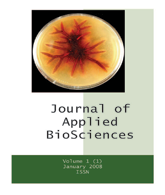Journal of Applied Biosciences (J. Appl. Biosci.) [ISSN 1997 - 5902]
Volume 9(2): 407 - 415. Published September 2008.
Effects of banana weevil damage on plant growth and yield of East African Musa genotypes
D. OCAN*, H. H. MUKASA*, P. R. RUBAIHAYO*, W. TINZAARA** and G. BLOMME***^
*Department of Crop Science, Makerere University, P.O. Box 7062, Kampala, Uganda; **Kawanda Agricultural Research Institute, P.O. Box 7065 Kampala, Uganda; ***International Network for the Improvement of Banana and Plantain (INIBAP), East and Southern Africa Office, P.O. Box 24384, Kampala, Uganda.
^Corresponding author email: [email protected]
ABSTRACT
Objective: Banana weevil has been reported as a serious pest on banana, an important staple and food crop in the east African region. This study was conducted to establish the impact of weevil infestation on Musa spp. growth traits during the first crop cycle.
Methodology and results: Experiments were carried out using eight Musa spp. comprising of the East African highland bananas (Musa spp, AAA-EAHBgroup); Mpologoma, Lwadungu, Nakitembe, Mbwazirume and Kibuzi; the dessert banana Sukali Ndiizi (AAB); the plantain Gonja (AAB) and the beer banana Kayinja (ABB). All genotypes were assessed at bunch maturity. Weevil build-up and subsequent damage to the banana corms during the first crop cycle was low, presenting an average cross-sectional corm damage of 1.2%. Consequently, hardly any significant negative effects on yield and growth traits were observed.
Conclusion and application of findings: The results suggest that several ratoon cycles may be required in order to achieve a high weevil population density build-up to cause substantial reduction in yield and plant growth. The results also show that genotypes with a ‘B’ genome such as Sukali Ndiizi and Kayinja are more tolerant to banana weevils than genotypes with only ‘A’ genomes.
Key words: Cosmopolites sordidus, Musa spp., root system, yield.
FULL PAPER [PDF AVAILABLE HERE]
